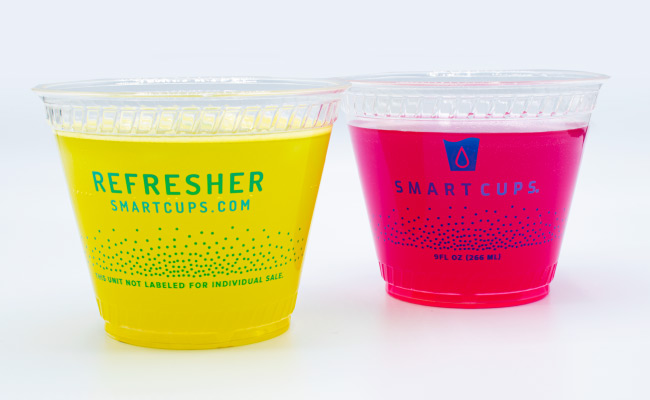In assessing the potential applications for its ingredient printing technology, Smart Cups is thinking big.
The Mission Viejo, California-based company launched its innovative concept with a six-SKU energy drink line in 2017, but as founder and CEO Chris Kanik is quick to note, Smart Cups is neither an energy drink company nor is it primarily a manufacturer of cups. Expanding adoption of the proprietary technology itself, which uses micro-encapsulation that allows ingredients to be printed on to any type of surface, has remained its long-term focus and where Kanik sees runway ahead, in CPG and beyond.
As the first in a slate of new products set to arrive over the next 18 months, Smart Cups’ Refreshers line — which launched online today — is set to help the company drive home its core message with a wider target demographic.
“I think what people need to understand is that Smart Cups is a sustainability driven technology company,” Kanik said. “We provide a solution to reduce storage and transportation requirements, and provide a solution for reduction of packaging on consumables, whether they are ingestible or not. That’s what we are.”
This week’s debut of Refreshers is another step in driving home that message, but also in building the brand’s presence and reach. Launching a caffeine-free beverage was a natural way to introduce more consumers to the brand and its core proposition, Kanik said, as he experienced within his own family with three young children, while also serving to recognize that the visual experience of using Smart Cups sparked interest from a broad range of audiences and age groups. The line is available in two sugar-free fruit flavors — Strawberry Watermelon and Sour Apple — in 10-packs of single-serving 9 oz. cups for $11.99 on the company’s website, smartcups.com, and on Amazon. As with the existing energy drinks, Smart Cups Refreshers are printed on plant-based bioplastic.
Even as it grows its own product portfolio, Smart Cups, which owns its production facility in Mission Viejo, is looking toward licensing agreements as a major source of growth moving forward. Earlier this year, the company announced a partnership with Tyson Ranch, a vertically integrated cannabis brand co-founded by former boxing heavyweight champion Mike Tyson, to develop ingestible CBD-based products, with the door open for THC-infused ones to follow. Beyond offering a point of differentiation, Kanik believes Smart Cups will help the nascent cannabis market address one of its major obstacles thus far: accurate, consistent dosing.
However, product innovation isn’t the issue; Kanik said the company has a “rich pipeline” of ideas and concepts, backed by in-house R&D capabilities. As those are gradually introduced to the market, Smart Cups will continue working to educate consumers about how the technology works and make its case to skeptical audiences through data and metrics.
“There are people who see a plastic cup and have a knee jerk reaction, and they say you are ruining the environment,” he said. “What we are offering is a solution to eliminate liquid transportation. That is an alternative and an option that has never previously been available.”
In Kanik’s view, those other alternatives — mainly powders and reusable water bottles — aren’t truly viable solutions. Powders and tablets are “not an option” for the “complex” formulations and applications Smart Cups is targeting, Kanik said, and are inconvenient because they still require a vessel to drink from. Meanwhile, he charged that the “true life cycle” of reusable water bottles has been overlooked and that questions remain over the net environmental effect of their use. To find the answers, Smart Cups is working with the University of California Los Angeles (UCLA) to study the environmental impact of its technology.
“There’s so much data around plastics and carbon emissions, but there is no real data on liquid transportation and how liquid transportation affects our environment,” Kanik said. “We are taking a broader look at this and over the next year we should have some very interesting data that we can then point to and to say that if you are truly committed to sustainability, then you need to seriously look at this technology and consider it for adoption.”
Looking ahead to Smart Cups’ future, Kanik believes that the pairing of innovative, sustainability minded technology with next-gen functional product types will spur interest in the format. Beverages based around sleep, immunity and cognition support are all in development, but further applications — which include a mouthwash product and a cup with a printed-on water purification system — tease the scope of Smart Cups’ versatility.
“It’s endless for us,” he said. “We are now taking the position of really expanding how the general public — not just from a B2C but also a B2B perspective — understands our technology and how it can be applied to their portfolio and provide sustainability solutions.”
